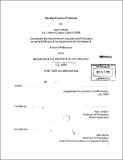| dc.contributor.advisor | Rae Langton. | en_US |
| dc.contributor.author | Hosein, Adam (Adam Omar) | en_US |
| dc.contributor.other | Massachusetts Institute of Technology. Dept. of Linguistics and Philosophy. | en_US |
| dc.date.accessioned | 2010-05-25T20:58:34Z | |
| dc.date.available | 2010-05-25T20:58:34Z | |
| dc.date.copyright | 2009 | en_US |
| dc.date.issued | 2009 | en_US |
| dc.identifier.uri | http://hdl.handle.net/1721.1/55180 | |
| dc.description | Thesis (Ph. D.)--Massachusetts Institute of Technology, Dept. of Linguistics and Philosophy, 2009. | en_US |
| dc.description | Cataloged from PDF version of thesis. | en_US |
| dc.description | Includes bibliographical references (p. 104-107). | en_US |
| dc.description.abstract | This dissertation is about fairness and the role it plays in political and personal morality. Specifically, I investigate when it is appropriate to rely on considerations of fairness to draw substantive conclusions about what we should do. In Chapter 1 ("Numbers, Fairness and Beneficence") I discuss the "numbers problem," the problem of explaining why you should save more people rather than fewer when forced to choose. Existing non-consequentialist approaches to the problem appeal to fairness to explain why. I argue that this is a mistake and that we can give a more satisfying answer by appealing to requirements of beneficence or generosity. In Chapter 2 ("Fairness, Distributive Justice and Global Justice") I discuss justice in the distribution of resources, both within states and across different states. On one influential view, it is always unjust for one person to have less than another through no fault of her own. State borders, on this account, have no importance in determining which distributions are just. I show that an alternative approach is needed. I argue that distributions of wealth are only unjust in so far as they issue from unfair treatment. It follows that not all inequalities in the distribution of goods are unjust. I use these results to explain how state borders do play a role in determining which inequalities are unjust, since some of these inequalities issue from unfair treatment of citizens by the state. In Chapter 3 ("Contractualism, Politics and Morality") I discuss Rawls' contractualist theory of social justice and Scanlon's extension of it to provide a theory of "rightness", or morality more generally. | en_US |
| dc.description.abstract | (cont.) I argue that while there is some justification for adopting a contractualist theory of social justice, this justification does not support a contractualist theory of rightness. This is because social justice is centrally a matter of cooperative fairness whereas rightness is not. | en_US |
| dc.description.statementofresponsibility | by Adam Hosein. | en_US |
| dc.format.extent | 107 p. | en_US |
| dc.language.iso | eng | en_US |
| dc.publisher | Massachusetts Institute of Technology | en_US |
| dc.rights | M.I.T. theses are protected by
copyright. They may be viewed from this source for any purpose, but
reproduction or distribution in any format is prohibited without written
permission. See provided URL for inquiries about permission. | en_US |
| dc.rights.uri | http://dspace.mit.edu/handle/1721.1/7582 | en_US |
| dc.subject | Linguistics and Philosophy. | en_US |
| dc.title | The significance of fairness/ | en_US |
| dc.type | Thesis | en_US |
| dc.description.degree | Ph.D. | en_US |
| dc.contributor.department | Massachusetts Institute of Technology. Department of Linguistics and Philosophy | |
| dc.identifier.oclc | 608233055 | en_US |
